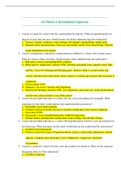ATI Pharm 1 Remediation Capstone
1. A nurse is caring for a client who has a prescription for digoxin. What are manifestations for
digoxin toxicity that the nurse should monitor for before administering this medication?
a. Toxicity- fatigue, weakness, vision changes, GI changes, dysrhythmias, bradycardia
b. Monitor before administration- Pulse rate and rhythm, notify if less than 60 bpm, Monitor
levels should be 0.5-0.8 ng/mL
2. A nurse is preparing to administer a topoisonmerase inhibitor to a client with ovarian cancer.
What are adverse effects the nurse should monitor when administering this medication?
a. Kill cancer cells by interrupting DNA synthesis
b. Bone marrow suppression- monitor WBC, absolute neutrophil count, platelet count, Hgb,
and Hct. Assess for bruising and bleeding gums. Instruct clients to avoid crowds and
contact with infectious individuals. Advise clients to continue precautions after treatment is
completed.
c. GI discomfort (N/V)
d. Alopecia- can occur 7-10 days after beginning
e. Monitor for bleeding, infection, CBC, give antiemetic, good oral care, avoid alcohol-based
mouth wash, advise females to use birth control
3. A nurse has provided education to a client who has a new prescription for exenatide. What
statements by the client would indicate they understand the instructions?
a. Exenatide is an incretin mimetic
b. Promotes release of insulin, decreases secretion of glucagon, slows gastric emptying
c. Can cause N/V/D
d. Pancreatitis- severe intrabdominal pain, withhold medication
e. 60 mins before morning and evening meal, keep in fridge, discard after 30 days
4. A nurse has provided education to a client with hypothyroidism who has a new prescription for
levothyroxine. What statements by the client would indicate they understand the instructions?
a. Synthetic thyroid hormone
b. Overuse can result in signs of hyperthyroidism- anxiety, tachycardia, palpitations, altered
appetite, cramping, heat intolerance, fever, diaphoresis, weight loss, menstrual
irregularities
5. A nurse is caring for a client who has a new prescription for alosetron. What are the expected
therapeutic effects of this medication?
a. For IBS w/ diarrhea
, b. Can cause GI toxicity- ischemic colitis, bowel obstruction, impaction, or perforation,
watch for bleeding, cramping, diarrhea
6. An oncology client is prescribed filgrastim. What are the indications for this therapy?
a. Leukopoietic growth factors stimulate the bone marrow to increase production of
neutrophils
b. Used for cancer patients with neutropenia, or prior to autologous transplant
7. A nurse is placing an IV line on an older adult client. List three (3) considerations the nurse
should take when placing an IV line in this client?
a. Use correct size catheter for type of fluid going through line
b. Older adults have fragile veins, avoid tourniquet and use BP cuff
c. Avoid using back of client’s hand
8. A client with hypertension is prescribed verapamil. What are the three (3) expected outcomes
of this medication therapy?
a. Decrease force of contraction
b. Decrease heart rate
c. Slow rate of conduction through SA and AV nodes
9. A critical care client is in need of adenosine. What is the indication of this medication and
how is this medication administered?
a. Used for Paroxysmal SVT, Wolff-Parkinson-White syndrome
b. Adenosine has a very short half-life, so adverse reactions are mild and last for less than 1
min.
c. Administration should be by IV bolus, flushed with saline following administration
10. A home health nurse is evaluating the client's knowledge of the medication terazosin. Which
statement by the client alerts the nurse the client needs further education on this medication?
"I will take my medication at bedtime"."This medication will help my urinary output.""I will
get out of bed slowly when waking.""I will take this medication after eating."
a. Take this medication after eating indicates a need for further teaching
b. Terazosin will increase urinary output, can case hypotension so they should get out of bed
slowly, and they should be taking it daily before bedtime
11. A client is to take metronidazole. List three (3) teaching points to review with the client prior
to administering the first dose.
a. Can cause nausea, vomiting, dry mouth, and a metallic taste
b. It can darken urine
c. Avoid alcohol, it can cause flushing, vomiting, tachycardia, and dyspnea
12. The client has been ordered ranitidine. List three (3) teaching points to discuss with the client




